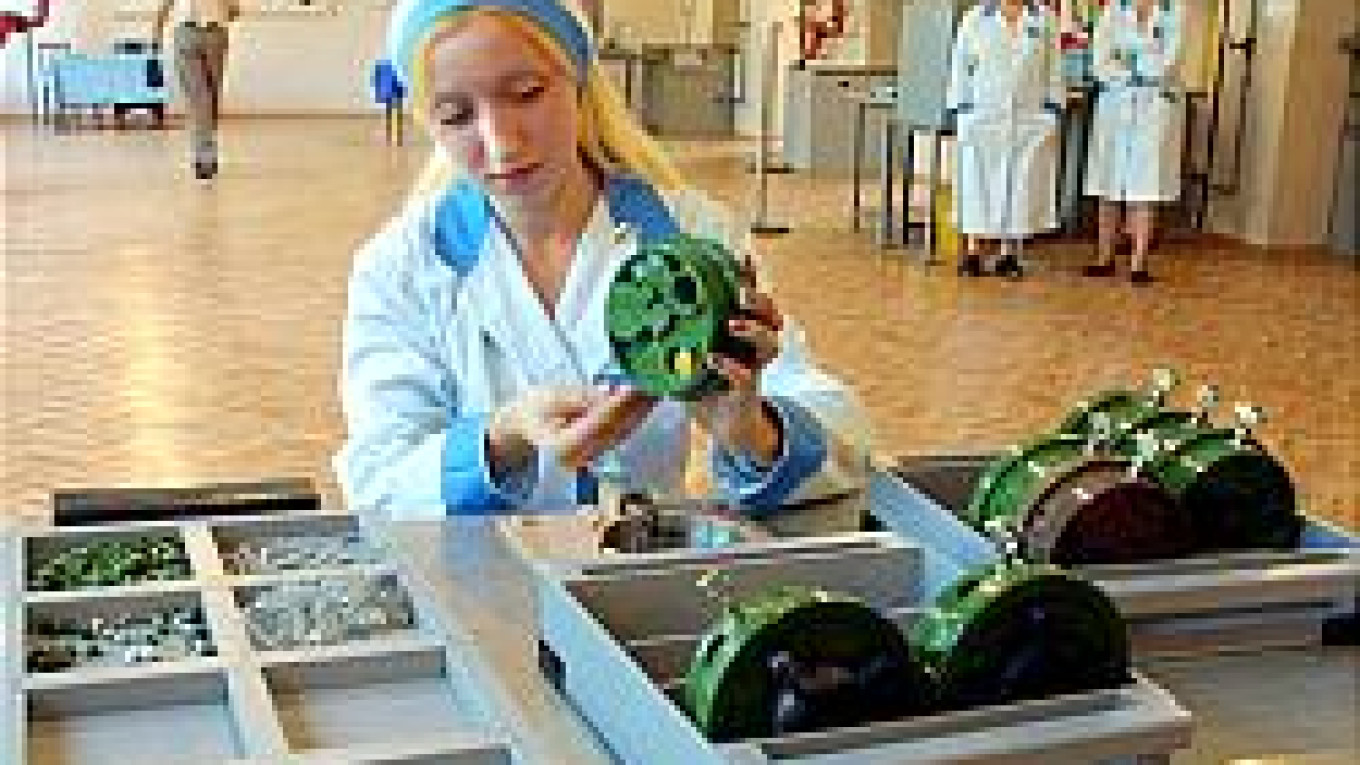The toys themselves are unremarkable: scoop-billed birds the size of a shoebox and mini shovel-and-pail sets. But their history is something else: In their former incarnation, these toys were casings for anti-personnel land mines.
The mines-to-toys project evolved from an $800,000 NATO-sponsored program to help demilitarize Ukraine. It aims to reduce Ukraine's stockpile of some 6.4 million anti-personnel mines -- the fourth largest arsenal in the world after China, Russia and the United States -- and help the country's massive defense complex retool for peaceful production.
The project is based at the formerly top-secret Donetsk State Chemical Plant in eastern Ukraine, where workers packed explosives into artillery shells and missiles.
"I always used to ask myself, 'What can I tell my kids about my job?'" said Lena Kazakova, a 14-year veteran of the plant whose twins were born the same year she started working.
"I used to just make something up. But now I can tell my girls something positive -- 'We're saving people's lives' -- and that makes me happy."
Kazakova is one of nine women who have been trained to shuck open mines and remove the explosives.
The mines are taken from a storage shed to a workroom, where a young woman carefully counts the boxes, checks that the mines haven't been destabilized in transit and removes the detonator. They then pass to a reassembly table where several women in lab coats and headscarves pry open the mines and remove the mechanical components.
The mine bodies, still armed, are then loaded into a pneumatic press that punches out the explosives. Two women then take the empty plastic mine bodies and explosive material off to be washed and recycled.
The whole process takes about 10 minutes per mine.
"I never imagined I'd be doing this," said Natalia Voloulina, an explosives handler who's spent 23 years at the plant, adding that her new work was "the most satisfying job I've had."
All the mines stored at the plant, some 400,000 in all, are expected to be dismantled by next September.
The Donetsk plant's Soviet experience working with explosives made it a good fit for NATO's project; so did its toy-making history. In addition to its weapons production, the plant manufactured toys until Ukraine split from the Soviet Union in 1991, but then lost state subsidies and couldn't find plastic cheap enough to compete with China.
The NATO mine destruction project prompted the plant's staff to use the mine bodies, mixed with higher-grade plastic, to resurrect its toy production.
Factory management plans to sell the toys but will also donate many to the region's cash-strapped orphanages and kindergartens.
"We have to think about social issues [and] what we can do ... kids need help," said Nikolai Potapchuk, the plant's director.
The plant's engineers also designed innovations to make the sticks of TNT that coal miners use in Ukraine's methane-infused mines safer and cheaper, reusing explosives from the disarmed land mines and other munitions.
Project workers see the NATO project as a chance to position the plant to win work in what they hope will be a growing market.
"Who knows? Soon we may be helping America destroy its mines," chief engineer Grigory Volodchenko said.
A Message from The Moscow Times:
Dear readers,
We are facing unprecedented challenges. Russia's Prosecutor General's Office has designated The Moscow Times as an "undesirable" organization, criminalizing our work and putting our staff at risk of prosecution. This follows our earlier unjust labeling as a "foreign agent."
These actions are direct attempts to silence independent journalism in Russia. The authorities claim our work "discredits the decisions of the Russian leadership." We see things differently: we strive to provide accurate, unbiased reporting on Russia.
We, the journalists of The Moscow Times, refuse to be silenced. But to continue our work, we need your help.
Your support, no matter how small, makes a world of difference. If you can, please support us monthly starting from just $2. It's quick to set up, and every contribution makes a significant impact.
By supporting The Moscow Times, you're defending open, independent journalism in the face of repression. Thank you for standing with us.
Remind me later.


